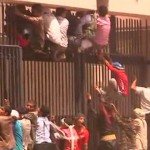 Protests against an anti-Islam film made in the US are spreading across the Middle East and North Africa.
Protests against an anti-Islam film made in the US are spreading across the Middle East and North Africa.
In Yemen, demonstrators briefly stormed the grounds of the US embassy in Sanaa and burned the US flag, but were driven back by security forces.
In Egypt, 70 people were injured in protests, the health ministry said. Protests were also reported in Morocco, Sudan and Tunisia.
On Tuesday, the US ambassador to Libya was killed in Benghazi.
US officials say they are investigating whether the attack in Libya was planned, citing suspicions that a militant jihadist group may have co-ordinated the violence.
US Secretary of State Hillary Clinton condemned the film which gave rise to the protests as « disgusting » and « reprehensible ».
The US utterly rejected its contents and its message, she said, but the film was no excuse for violence.
Anti-American anger
Police in Sanaa shot in the air but failed to prevent crowds gaining access to the embassy compound and setting fire to vehicles.
Security force reinforcements used tear gas, water cannon and live fire to drive protesters back.
There were reports of injuries on both sides, although Reuters carried a statement from the embassy saying there were none.
Windows were smashed. A US flag was torn down and replaced with a black flag bearing the Muslim statement of faith, « There is no God but Allah ».
It was not immediately clear whether the embassy was occupied. There are reports that embassy staff have been moved to a safer location.
In Egypt, protests erupted for a third day outside the US embassy in Cairo, with some demonstrators demanding the expulsion of the ambassador.
Police fired tear gas at crowds throwing stones.
It followed protests on Wednesday, in which demonstrators breached the embassy wall and tore down the flag.
Overnight into Thursday, 16 people were injured and two police vehicles burnt out, the interior ministry said. Twelve protesters were arrested.
President Mohammed Mursi appealed for calm, saying Egyptians « reject any kind of assault or insult » against the Prophet Muhammad.
« I condemn and oppose all who… insult our prophet. [But] it is our duty to protect our guests and visitors from abroad, » he said in a statement broadcast by state media.
« I call on everyone to take that into consideration, to not violate Egyptian law… to not assault embassies. »
In other developments:
Iranians chanting anti-US and anti-Israel slogans stage a protest outside the Swiss embassy in the Iranian capital, Tehran, which represents US interests
Afghan President Hamid Karzai has postponed a planned visit to Norway, fearing violence could erupt in his country
A small protest has taken place in Dhaka, Bangladesh, demanding that the film-maker be punished
In Iraq, there have been demonstrations in Baghdad and Basra, with the leader of one Islamist militia warning the film « will put all American interests in danger »
Unrest is also reported in Morocco, Sudan and Tunisia
Pakistani police say they « expect some protests » at the US embassy in Islamabad and are preparing to deal with them, the AFP news agency reports
Security has been increased at US embassies and consulates around the world; US officials say a marine anti-terrorism team is being deployed to Libya and two destroyers to the Libyan coast as a precautionary measure
‘Duty to protect’
US officials have described the Benghazi attack as complex and professional, and suggested the attackers may have used the film protest as a pretext for the attack.
Reuters news agency quoted officials saying there were suspicions that a militia known as the Ansar al-Sharia brigade was responsible, although the group has denied the claim.
The officials said there were also reports that al-Qaeda’s North Africa-based affiliate, al-Qaeda in the Islamic Maghreb, may have been involved, the news agency reports.
The obscure film which has sparked anger, called Innocence of Muslims, was shot in the US and posted online earlier this year. Clips have since been shown on Arab TV stations.
It depicts the Prophet Muhammad as a womaniser and the bloodthirsty leader of a ragtag group of men who enjoy killing.
The BBC’s Alastair Leithead says the exact origin of the movie and the internet clip, and the motivation behind its production, remains a mystery.
The most offensive comments regarding Muhammad appear to have been dubbed on later, says our correspondent.
Some of the actors involved have since condemned the film, and said they had no idea it was to be used as anti-Islam propaganda.
bbcnews



